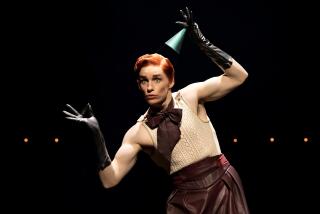Dueling ‘Amadeus’ Stars Give Story Some Punch
L.A. is full of modern-day Antonio Salieris who think of themselves as thwarted, misunderstood Mozarts. As such, Peter Shaffer’s 1979 “Amadeus” may well carry an extra layer of resonance here.
Shaffer’s play always had an ingenious pop hook in its favor. Its theme is hackdom, and hacks are universal. Fear of hackdom, or worse, the confirmed self-realization thereof, is an international fear, detectable far outside the entertainment industries. (No, really.) Everyone, everywhere knows envy. At heart, Shaffer’s play is a royally entertaining revenger’s comedy, the revenge of the hack upon the upstart genius.
Despite its airs, its intimations of larger themes, “Amadeus” never could withstand its more gurgling praise. Mainly it’s good, solid stagecraft, highly (if not deeply) actable. The fine new revival of “Amadeus” now at the Ahmanson Theatre in a post-London, pre-Broadway engagement proves its stage worthiness all over again.
David Suchet, television’s Hercule Poirot, graces director Peter Hall’s staging with a witty, richly brocaded characterization of Salieri, the court composer who knew no greatness. And as Wolfgang Amadeus Mozart, Salieri’s infantile nemesis in late 18th century Vienna, Michael Sheen transcends the role’s giggling-maniac temptations and limitations. This is the primary achievement of director Hall’s revival; it gives us something like a fair dramatic fight between polar opposites.
Those who know “Amadeus” only from its Oscar-laden 1984 Milos Forman film may be surprised at the tonal differences between the stage and screen versions. Forman’s movie, adapted by Shaffer, puffed up the material (while letting Tom Hulce’s Mozart get away with a one-note aggravation of a performance). On stage “Amadeus” is more of a scamp, lighter on its feet. It revels in its own devices. Salieri goes from old man to young man, and back again, in a flash. As he brings the audience into his confidence, he takes us back to the Vienna of his heyday, when life was sweet. Until he met Mozart.
Did Salieri poison Mozart? Why has God forsaken Salieri, and smiled upon the “obscene child” Shaffer’s Mozart reveals himself to be, in scene after scene? When he’s not directly addressing God, Salieri asks us these and dozens of other rhetorical questions. The role of Salieri is essentially an extended rhetorical question.
It’s also great fun, at least when a good actor takes its reins. Suchet has the artful duplicity and court politician’s wiles down pat. The way he swoons over a snow dumpling, a “Nipple of Venus” or a spoonful of crema al mascarpone says as much as Suchet’s Salieri taking in the music of his ingloriously behaved enemy. It’s a first-rate turn, showy yet subtle, nicely in tune with the shameless coloratura qualities of Shaffer’s writing.
The Mozart we see in “Amadeus” is a scatological buffoon with some inspired music in him. Shaffer sets him up as a screaming offense to proper, dull mediocrity. In Act 2, we’re asked to take Mozart’s poverty-stricken, Salieri-influenced downfall seriously. It’s not easy. But Sheen’s Mozart finds the way. He’s actually endearing in his offensiveness, and his performance is extraordinarily nimble, with whip-crack timing (and, happily, a giggle we can live with). Shaffer has tweaked the script a bit to temper the role’s excesses, and it helps. Sheen brings out every tonality it offers, working in skittery counterpoint to Suchet’s elegantly sly Salieri. (Rocco Sisto, the Salieri standby, fills in for Suchet on Sunday evenings Oct. 17 and 24 and Nov. 21; on the Sunday matinee Nov. 7; and on the Friday matinee Nov. 26.)
Even with two excellent leading performances, Hall’s revised staging of his original production suffers from a touch of the portentous, along the movie’s lines. The opening scene, in which the two “Venticelli” (Jake Broder and Charles Janasz) spew gossip and rumor, is taken at an oddly leisurely pace. Hall and Shaffer give more weight to the Act 2 scenes between Mozart and Salieri, but they’re on the heavyish side for an essentially larkish enterprise. Also, scenic designer William Dudley’s set isn’t up to John Bury’s original.
Is there a great hunger to see “Amadeus” again? It’s hard to say. In London this revival fared only fairly well. It isn’t a substantially rethought rendition. It’s not memorably acted in its middle ranks.
It is, however, an occasion for Suchet and Sheen to play off each other. And that’s occasion enough.
* “Amadeus,” Ahmanson Theatre, Music Center of Los Angeles County, 135 N. Grand Ave., downtown. Tuesdays-Fridays, 8 p.m.; Saturdays, 2 and 8 p.m.; Sundays, 2 p.m. Also: Oct. 17, Oct. 24, Nov. 7 and Nov. 21, 7:30 p.m.; Oct. 28 and Nov. 11, 8 p.m.; Nov. 22, 8 p.m.; Nov. 26, 2 p.m. (No performance Thanksgiving.) Ends Nov. 28. $25-$55. (213) 628-2772. Running time: 3 hours.
David Suchet: Antonio Salieri
Michael Sheen: Wolfgang Amadeus Mozart
Cindy Katz: Constanze Weber
David McCallum: Emperor Joseph II
J.P. Linton: Count Johann Kilian Von Strack
Terence Rigby: Count Orsini-Rosenberg
Michael Keenan: Baron Van Swieten
Jake Broder, Charles Janasz: The “Venticelli”
John Rainer: Major Domo
William Ryall: Salieri’s Valet
Robert Machray: Salieri’s Cook
John Towey: Kapellmeister Bonno
Glynis Bell: Teresa Salieri
Kate Miller: Katherina Cavalieri
Written by Peter Shaffer. Directed by Peter Hall. Set and costumes by William Dudley. Lighting by Paule Constable. Sound by Matt McKenzie. Production stage manager Susie Cordon.
More to Read
The biggest entertainment stories
Get our big stories about Hollywood, film, television, music, arts, culture and more right in your inbox as soon as they publish.
You may occasionally receive promotional content from the Los Angeles Times.










